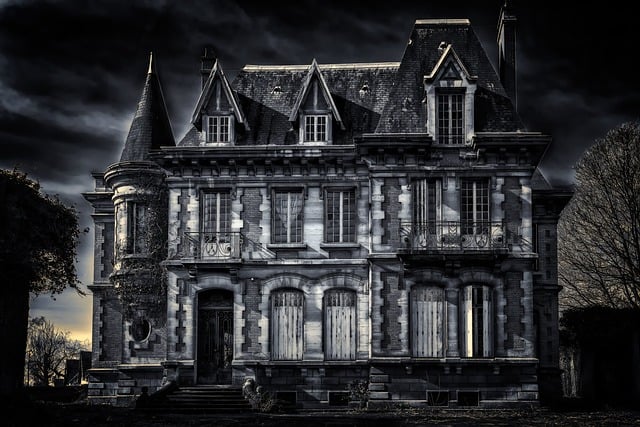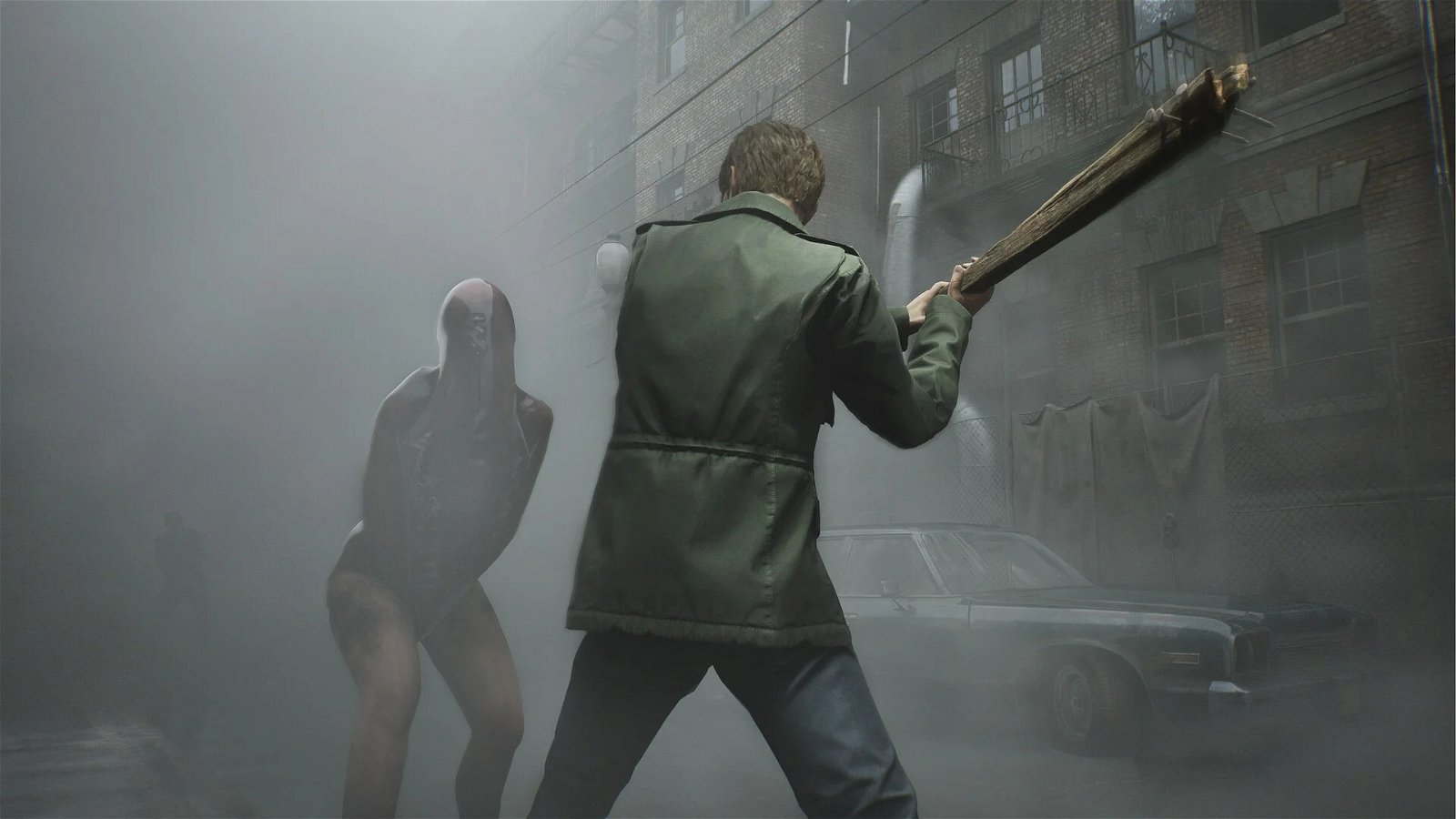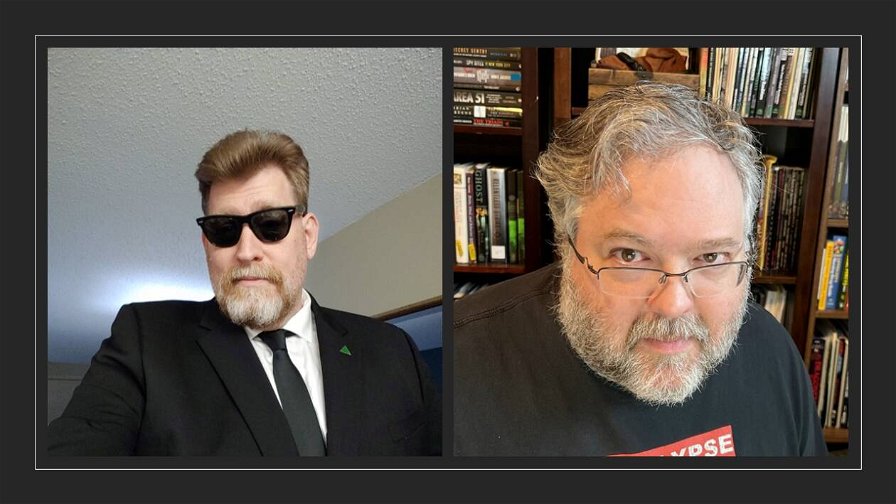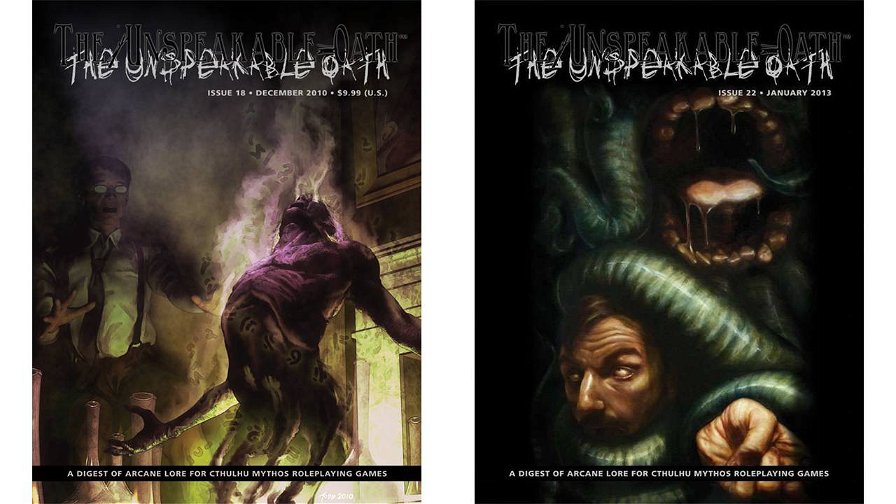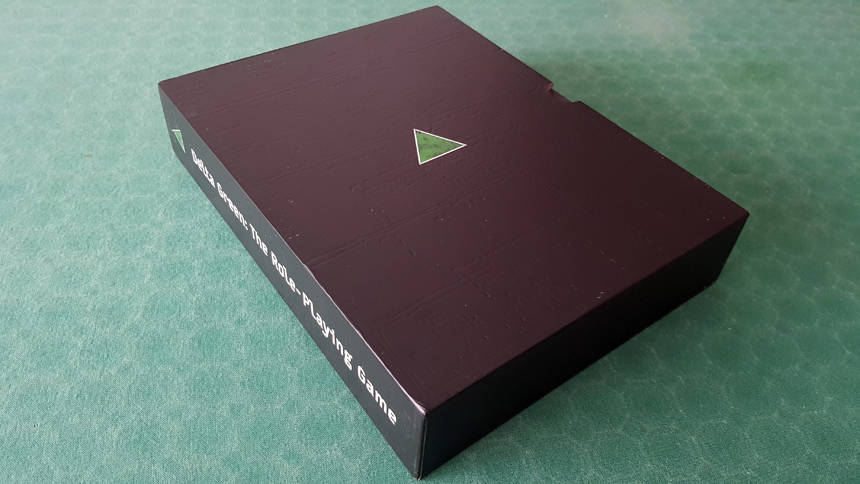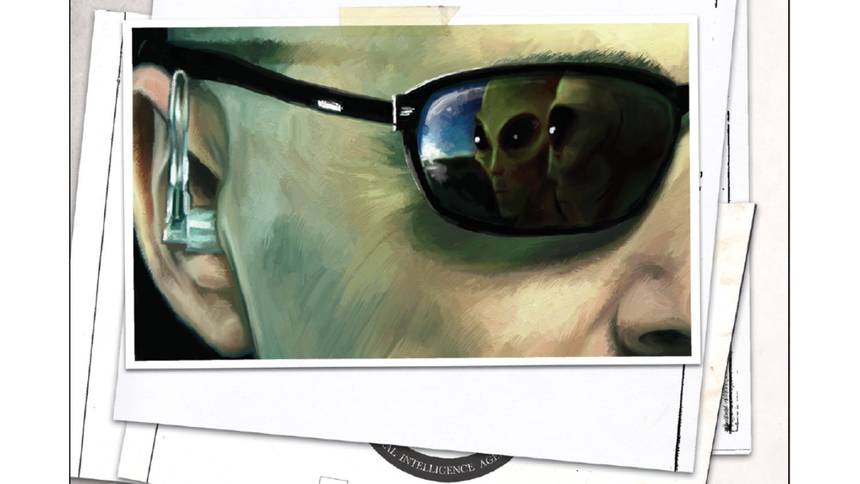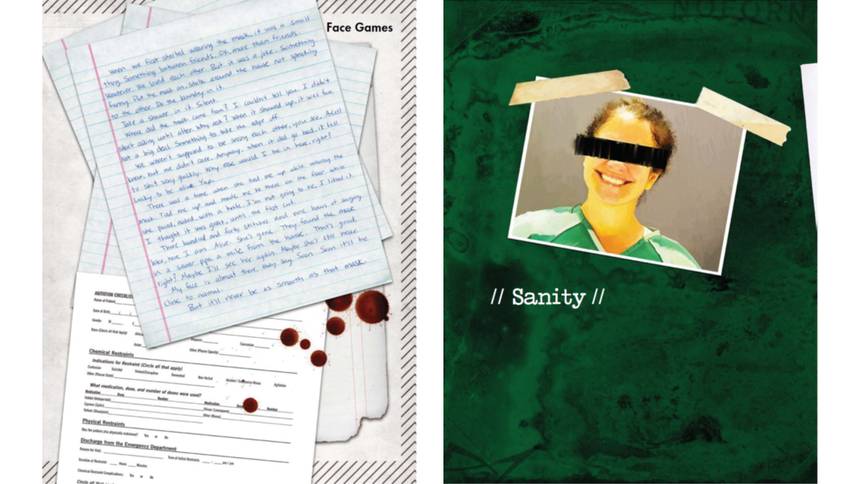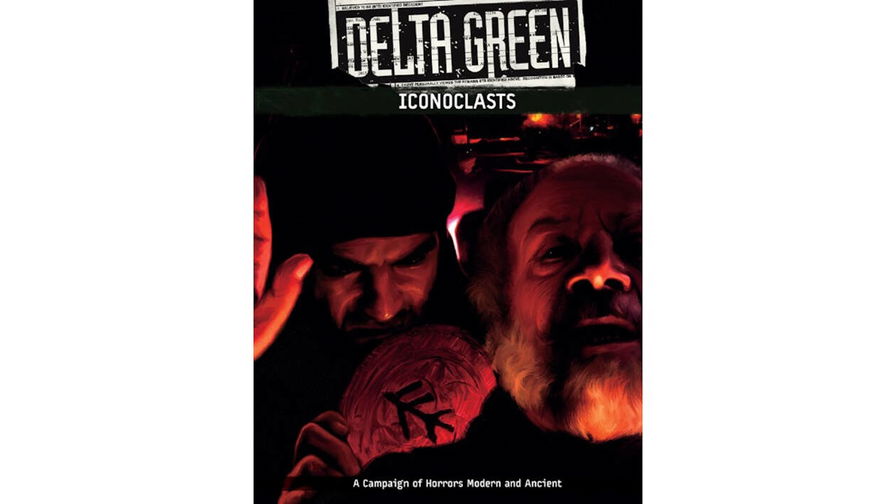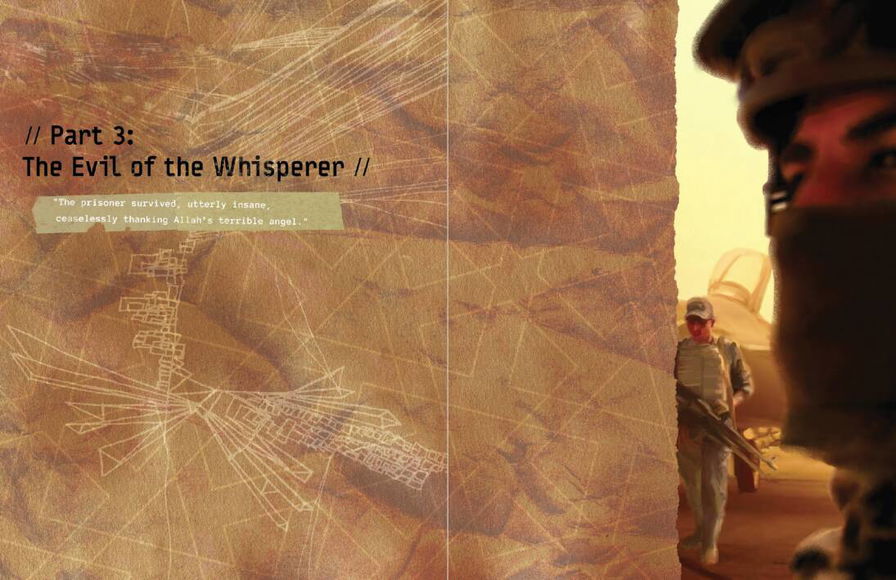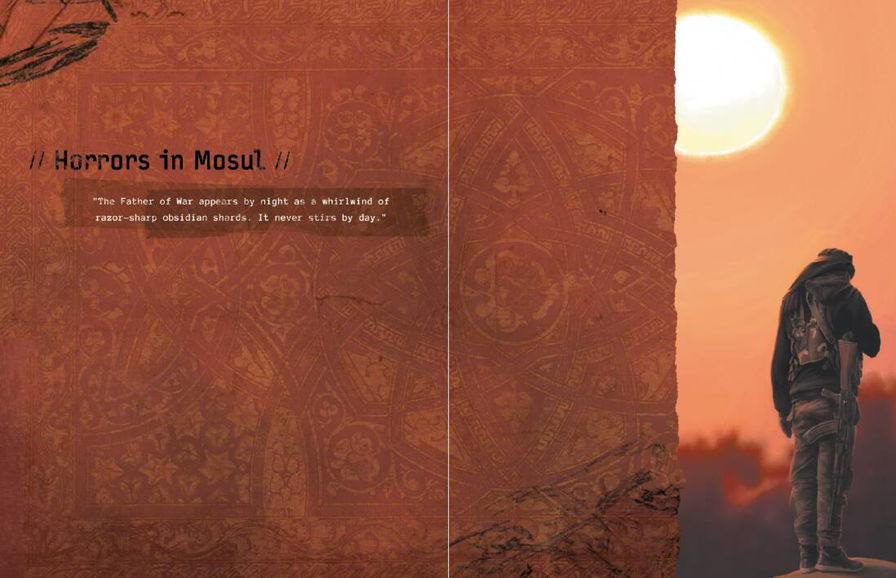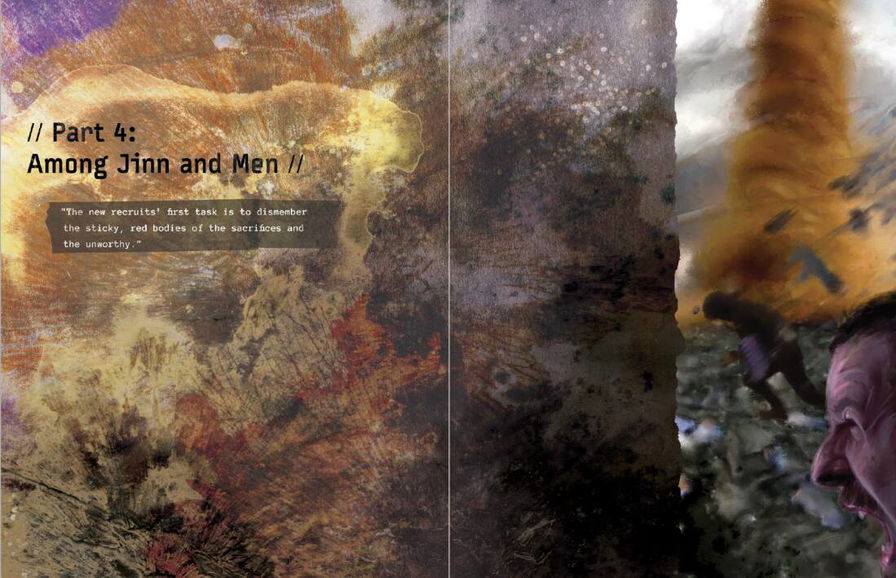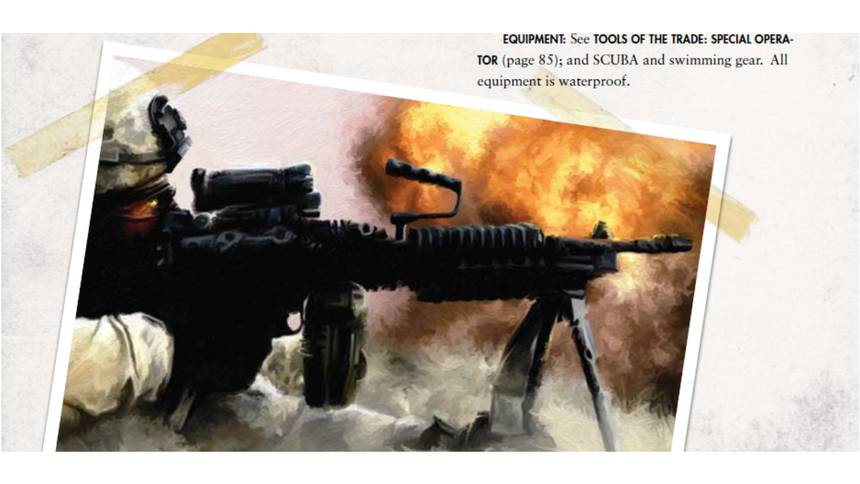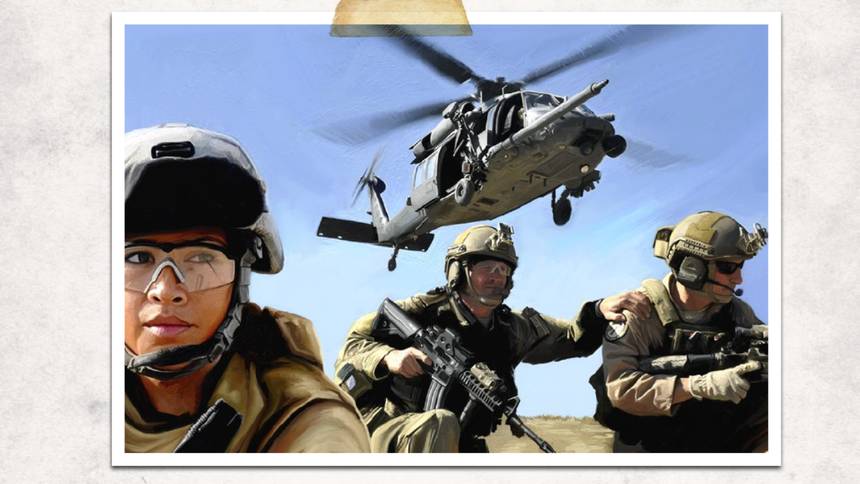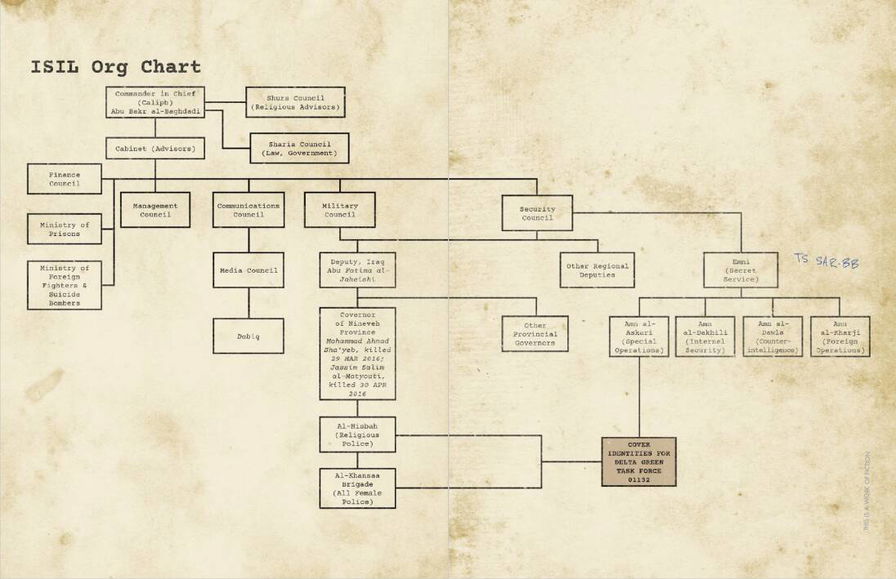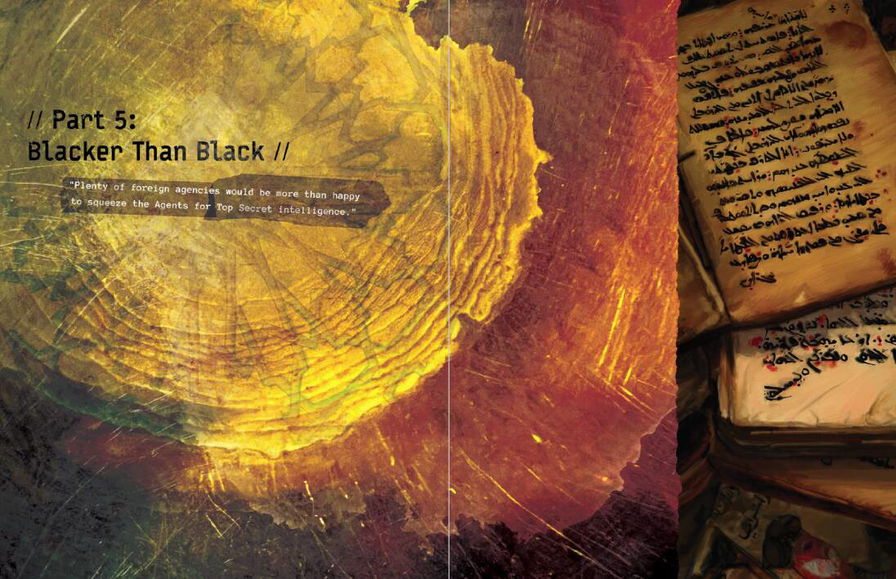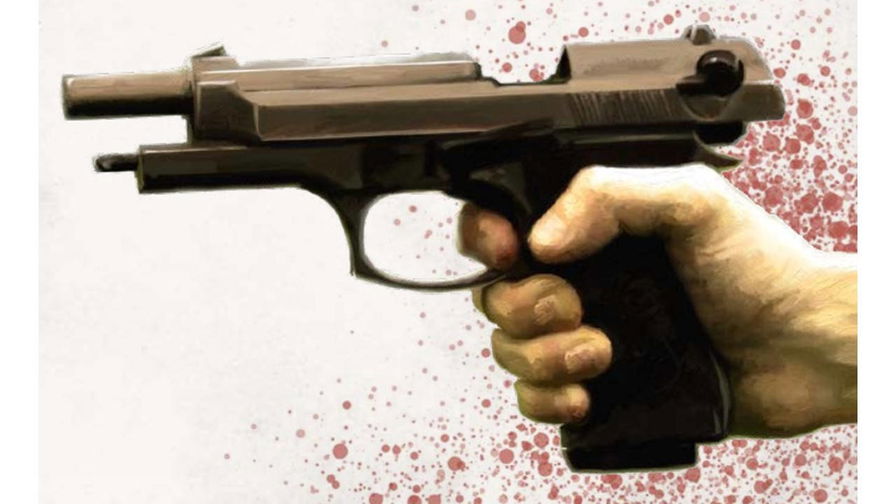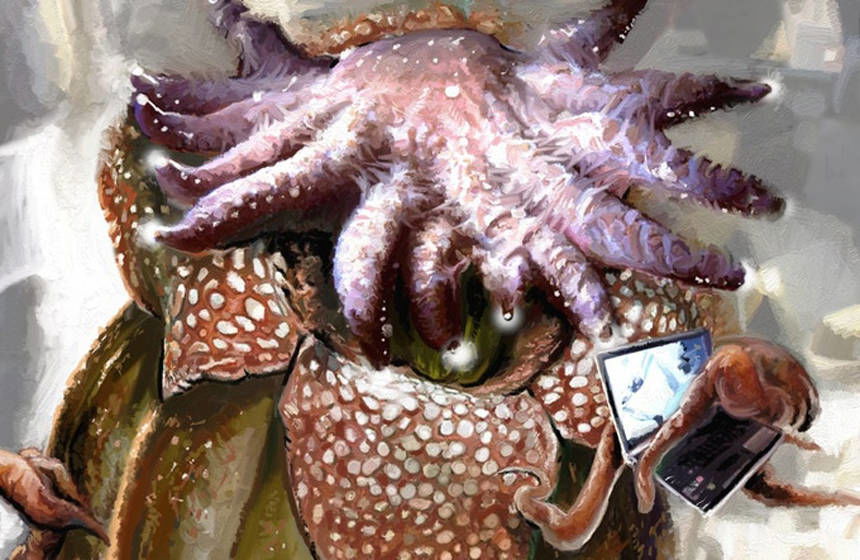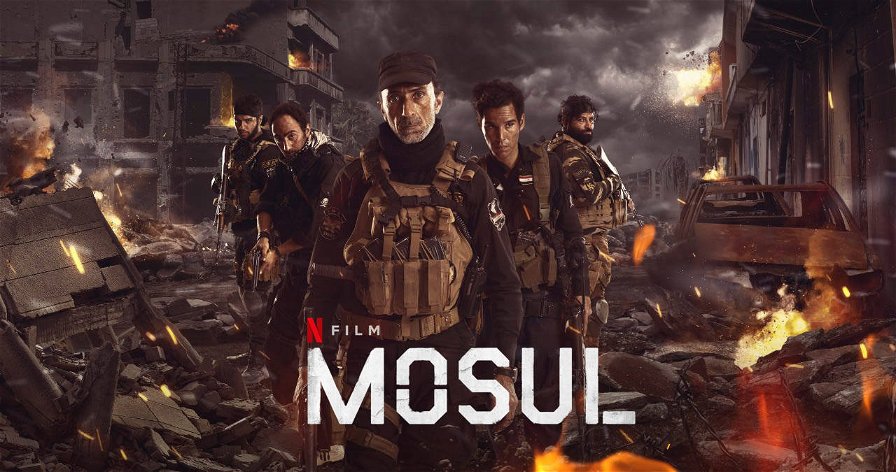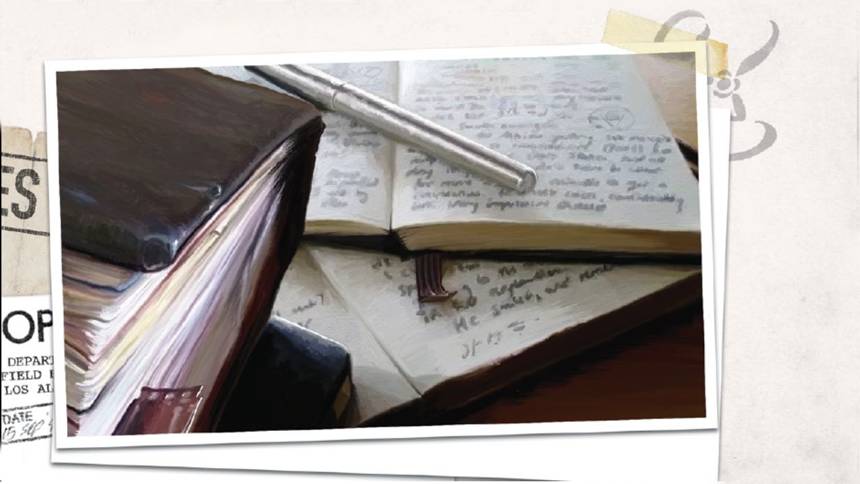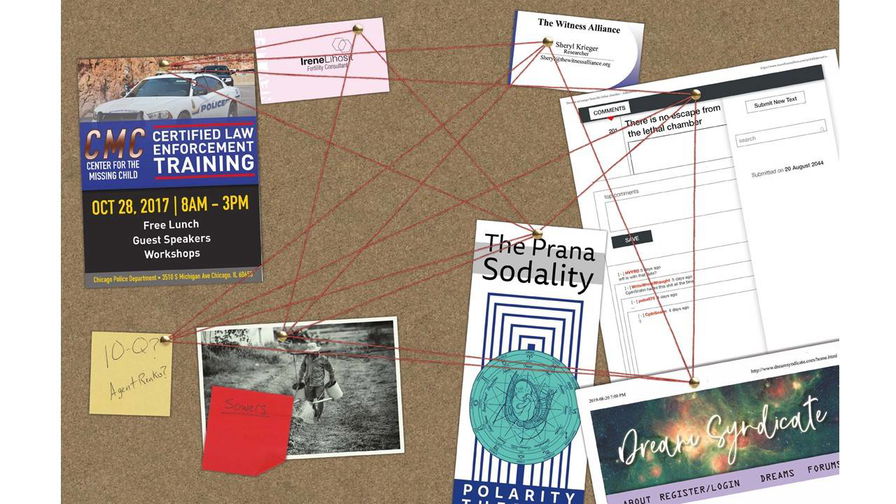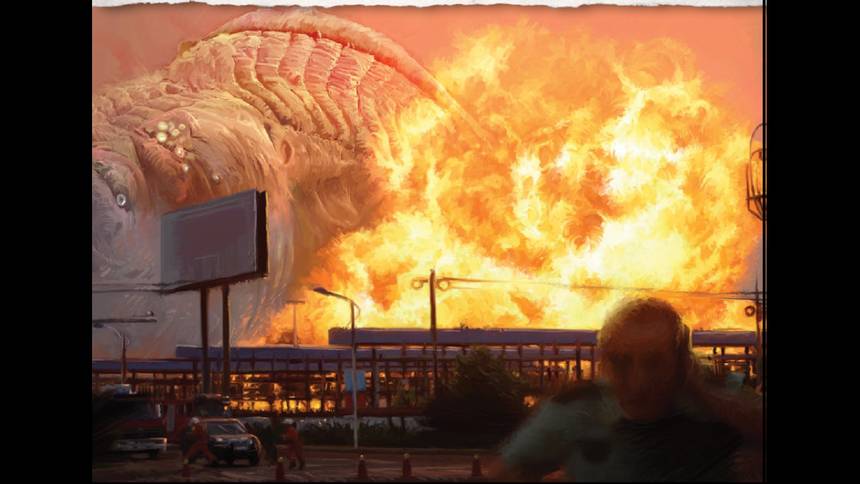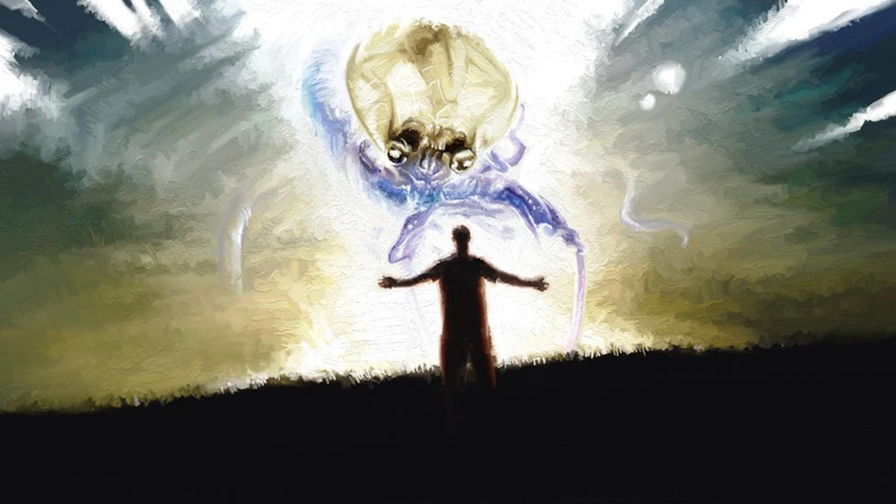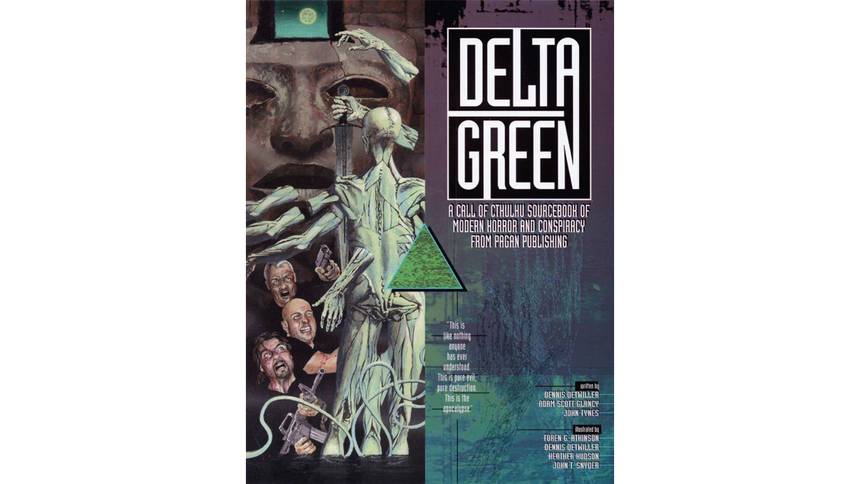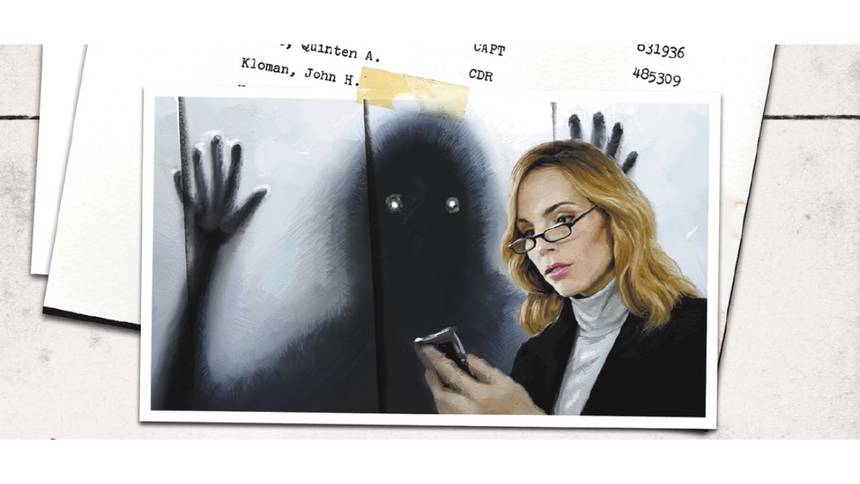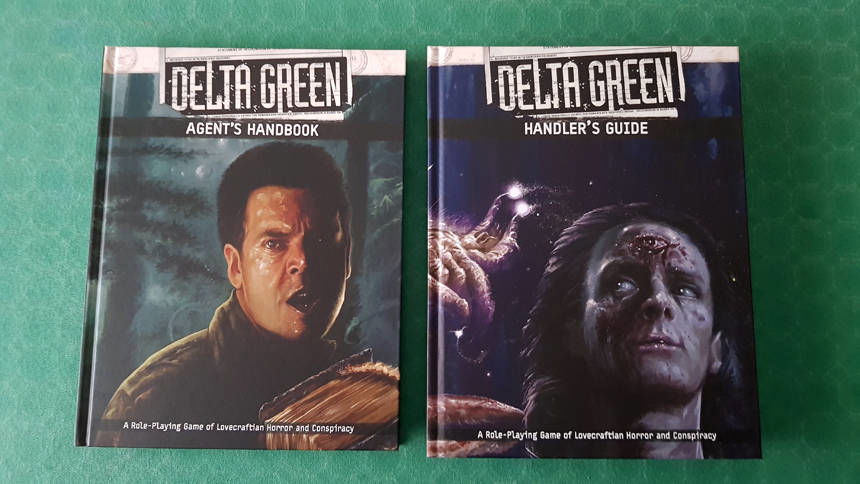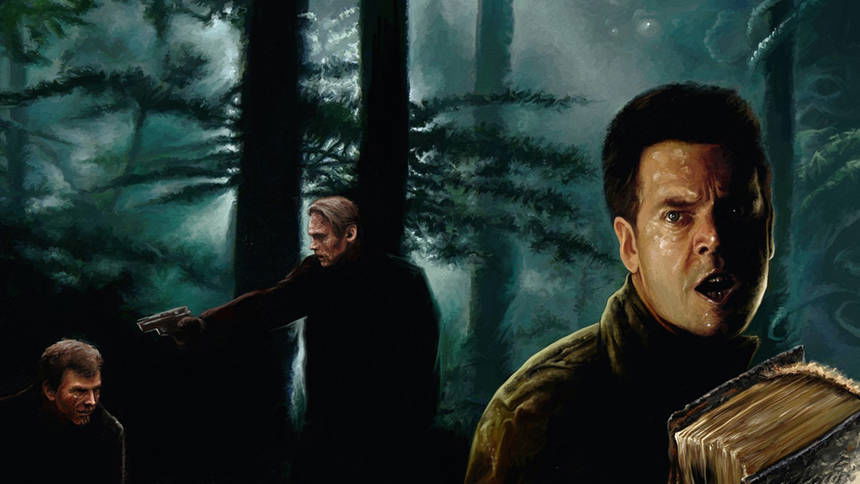In recent days we had the opportunity to interview Adam Scott Glancy, one of the authors of the original role-playing game Delta Green from the 90s (which will soon see the light again thanks to a revised and updated re-edition, for the 25th anniversary of the first publication) and author of Delta Green: Iconoclasts, the new campaign for the current Delta Green RPG. Shane Ivey, one of the authors of the current edition of the Delta Green RPG and CEO of Arc Dream Publishing, as well as co-author of Delta Green: Iconoclasts, which we had had the pleasure of interviewing a couple of years ago, also spoke with Adam Scott Glancy.
During the interview, the authors talked to us about the genesis of the Delta Green: Iconoclasts project and we also discussed the Delta Green RPG more generally, as well as future Arc Dream Publishing projects. So, let's not delay and let's dedicate ourselves to the interview!
Delta Green: Iconoclasts, the interview with the authors
Hi Shane, it’s a pleasure to meet you again, hi Adam, nice to meet you! Thank you for your time, guys. Please, Adam, can you tell us something more about yourself: when did you approach the world of role-playing games?
Shane Ivey: Hi Davide, it's a pleasure to see you again!
Adam Scott Glancy: Hi Davide, my pleasure! Okay, so, I'm Scott Glancy and my role-playing career started off in the late 70s. I had a teacher who had taught a specialized advanced program in my... I guess it was my junior high school. Yeah, the summer between grade school and junior high school, I would have been about 10 years or 11 years old at the time. And during the summer she recontacted some of the students that she had taught and said: "Hey, I found this interesting game that you might be interested in". And got together with two other students from the program, who also lived in my neighborhood, and we sat on the back porch of my parents’ house in Florida and played the original you know sort of box set of the Basic Set of Dungeons & Dragons. Just first level characters stumbling through a maze and yeah, that was my first experience with a role-playing game.
And yeah, I was hooked. And at the time, where I lived, which was very near Orlando, Florida, there was a little game shop in Orlando, Florida, called Enterprise 1701. This was 10, 15 years after Star Trek - The Original Series. And the guy who ran it was named Frank Dollar and he started off with a closet sized store. But eventually, it got to be, you know, the size of a couple of Blockbuster video stores. It got very large. Most of that was due to the fact that Orlando was where they based the Navy's nuclear technician school. So, there's all these servicemen who are nerds because they're in the nuclear technician program, who are going to be working on aircraft carriers and submarines, manning the energy, the power plants.
And so, they were always in there in their white navy leave uniforms buying role-playing games. And so, he did very well for himself over the years. He eventually retired, but that was where I always went. That's where all my gaming started off. And I quickly graduated from Dungeons & Dragons to Gamma World, to Top Secret to... Oh geez, I don't know, I remember back in the early 80s, I bought a lot of stuff that i wanted to play, but it was way too. It was the 80s and so there's a lot of stuff that was simulationist rather than role playing, and so you'd get games like Aftermath, where they had a two-page combat resolution flow chart, so combat was like doing your taxes. Yeah, it was a terrible, terrible system, but it was a great setting, because Mad Max 2 had come out and everybody wanted to play, you know, post-apocalyptic.
So, yeah, that's kind of where I started off. I played it all through college. I think I probably played more Mark Miller's Traveler than I did Dungeons & Dragon. Eventually because the options were so much broader in that game setting. But eventually, I played a lot of Call of Cthulhu in high school and college, and I played a lot of Twilight 2000. So, I had a lot of love for Game Designers Workshop back of the day.
What prompted you to become a game designer?
When I was in law school I decided as part of law school that I wasn't gonna own a television set, you know, I just wasn't gonna have a tv in that, because I figured I needed to keep my nose to the grindstone and work hard. But, you know, I was still kind of bored and wanted to do things, so I thought: "Well, let's start writing up stuff that maybe I had played with in college, in high school". I still had notebooks full of material, "Why don't I try and convert this stuff and submit it to things like Challenge magazine?", which was still a thing when I was first submitting stuff.
And I did and I got all kinds of rejection notices from Loren Wiseman over at Game Designers Workshop. I still have the letters that he sent me back when they sent you a printed letter. But at one point, I submitted something they got rejected from Challenge, I sent it to this little zine that I found in a store. There was a game store in Gainesville, Florida, I saw these covers by Blair Reynolds. This may have been the first one i saw before, I’m not sure (Scott shows me one of the very first issues of The Unspeakable Oath). I immediately ran out and got all the back issues, ordered them up from Pagan Publishing. It was The Unspeakable Oath and I thought: "Well, these guys might publish it".
So, I sent them this write-up that Challenge had rejected. I had this idea for putting the UFO mythology of the Men in Black. This is before the movies; I think three issues of the comic books that the movies were based on had come out. Before that I did, there's a long running mythology of the Men in Black that was part of UFO lore, and so I thought: "Well, maybe I could find a way to mix this into Call of Cthulhu. Not so that the players are the Men in Black, but so the Men in Black are a factor in the game. Possibly as a way to give the players their next mission, because there was always that problem in Call of Cthulhu of like: "Well, why does weird stuff keep happening to my librarian or my tribal fisherman or whatever my one of the weird character classes were that they kind of had back then”.
And so, I thought the idea that they have a contact who just shows up and presents them with: "There's the next weird thing, go investigate". I kind of had that idea. Well, I sent that into Pagan Publishing and John Tynes wrote back and said: "Yeah, you're going to need to look at the next issue of The Unspeakable Oath, because I think there might be something in there that's kind of like this". And the next issue of The Unspeakable Oath was number seven (Scott shows me issue 7 of the zine), which featured the very first Delta Green scenario: Convergence.
And this I think it was 1992. And so, I was like darn. And then John Tynes says: "You know, we're really interested in turning Delta Green into a whole thing, do you have any material that you could contribute?". And at the time I was in the middle of a job search in law school, and my main goal going to law school, because I was hoping to get a job at the FBI. Because that was one of the application paths: law school accounting degree, you know, military background... But I went to law school with the hopes of doing that, and so I thought: "Okay, I'll take a moment and I'll go through my job search, because I had gone, and I had added all the government agencies that I had. I thought about like: "Well, if the FBI doesn't work out, what else is there in law enforcement?". So, I've done all this research on the DEA, the IRS, the criminal division, the ATF... Just went through that. And basically, any place in the federal government that could need a lawyer dealt with law enforcement.
And I had already done all this sort of research and so I wrote up something for John saying: “Well here's, how about I give you this: I got this list of government agencies...". "Oh, that would be good!". And that's basically what shows up at the back of the first edition of Delta Green. It's the sheets of government agencies, when it was formed, how many men worked there, what's its budget... Things like that. And so, I turned that in and the result was that rather than send a letter back, John Tynes called me for the first time and said: "Oh yeah, we want this and we want more, so whatever you can produce". And I'm like: "Well, what do you need?". He says: "Well, we need Majestic 12, we need a historical background for Delta Green, we need that flushed out". They wanted Saucer Watch written up and the Karotechia, the cult that is the leftovers of Hitler's special weapons program.
That was maybe the only thing that was 100% original to me in that book. I mean, the Majestic 12 stuff he'd already introduced in Convergence and Delta Green, so I was just flushing that stuff out for John, but he was happy with the work and that's how i started doing game design, going out and joining Pagan Publishing.
And I know that you were also the CEO of Pagan Publishing, if I remember well, and so what prompted you also to start your own publishing house?
I didn't start my own company, I joined Pagan Publishing and the opportunity came up because I was not enjoying my job as a prosecutor. I was working in local law enforcement as a criminal prosecutor. I wasn't enjoying the job, my grandmother had passed away and left me some money that would have supported me for a little while, and I thought: "What I'm going to run away? I'm going to run away and join the nerd version of the Foreign Legion. I'm gonna live in a house with five other guys".
I was there with John Crowe, Dennis Detwiller, John Tynes, and Blair Reynolds, the artist who had created those covers originally. Brian Appleton had just moved out, so they needed another roommate. And so, you know, I moved in with them and it is not unfair to describe that house as being a frat house for serial killers. It was very much a guy's post-college dwelling, even though they were a little further along than post college. I think John may have been working at Wizards of the Coast at that point. He's since gone back to work for far more money, with much more responsibility, but back in the day he was just a grunt for that particular organization. So, that's how i ended up working for Pagan Publishing and I've been looking I was lucky enough that Delta Green was very well received, and we got to write more for it.
About Delta Green
We have published a rather comprehensive review of the two Delta Green Core Books, and we also talked about it with Shane and Dennis Detwiller in previous interviews, but I want to take advantage of the presence of another one of its authors, therefore Scott, explain us, what is Delta Green?
Well, Delta Green RPG is a stand-alone set of rules for playing a combination, we used to say, of H.P. Lovecraft, Robert Ludlum and John le Carré. But when we used to say that in pitch meetings, when we were trying to get like a video game company to pay attention to Delta Green, their eyes would glaze over. And so, later, I think it was John Tynes one who said it, we said it's Tom Clancy meets Stephen King. And when they said that everyone's like: "Oh, okay, they wrote that down because that's the thing that makes money plus another thing that makes money". And that's not really accurate.
There are elements of sort of Tom Clancy techno thriller in some of Delta Green, but it is far more closer to something like John le Carrè. In that it's about very personal horrors, it's not about the gear, it's not about the equipment. Certainly, there were people who worried that: "Oh no, you've introduced government agents and spies into Call of Cthulhu style gaming investigations, you're going to make it too easy". It's going to make it like: "Oh we're going to punch Cthulhu in the face with a nuke and solve the problem".
And I was very happy when I ran into Sandy Peterson, the writer of Call of Cthulhu, at the H.P. Lovecraft film festival and he says: "You know, when I saw Delta Green come out, I thought 'oh they're gonna nerf, they're gonna make Call of Cthulhu easy', that this is all about making Call of Cthulhu easy... But then I read the book and no, you you made it worse! You actually made it harder". And I'm like: "Good that's what we wanted demonstrate, that having government connections and firepower and drone strike did not help the problem, because you're dealing with stuff that doesn't care about drone strikes a lot of the time".
And sure, you might be able to machine gun a few Deep Ones, but you could machine gun Deep Ones to death in the 1920s all right. That's not an advantage for the modern age. If anything, it's a disadvantage, because at least in the 1920s you could buy a fully automatic Thompson machine gun through the mail and have it delivered to you. Today, you fire an automatic weapon then all these law enforcement agencies will show up and ask why are you firing an illegal weapon.
So, I thought that we married a supernatural investigation with the sort of cloak and dagger thriller stuff, thriller conspiracies. Certainly, the original Delta Green was very much about marrying modern conspiracy ideas with the Cthulhu Mythos, as a lens to view the Cthulhu Mythos from. In fact, while I was in law school and I said I didn't have a tv set, and I was house sitting for a friend of mine and I was just flipping channels and I turned on FOX and there's a scene where there's, I didn't know what I was watching, but there's these actors and they're raising a coffin out of the ground for resuming a body, and then the rope snaps and the coffin rolls over and the body inside is all weird and twisted and screwed up. And I'm like: "What the hell am I watching, right?" So, I watched the end and it's the pilot episode of The X-Files. This is after I'd already talked to John Tynes about: "Oh, we've got to make it, we're gonna work together". And I am working, and I see this first episode, I am blown out of my socks. I mean, this is about half of what we were talking about, right here going on the tv screen.
In fact, I had a friend in Chicago who worked for a video clipping service, they videotaped all the channels and then they would archive all these VHS tapes and then they would sell them to clients, if you needed to see how you're on a news story again. This is how you get it, this is the age before TiVo, before people could had streaming services or YouTube or anything like that. So, I immediately contacted says: "I saw this thing on FOX and X-Files, saw the first episode, can you send me a videotape of the first episode?". And they do.
And I watch that, and I'm like: "Well, not only am I going to have to buy a tv set and a cable subscription, for the one reason so I can watch this show", but I start taping it, I start sending the tapes to my friend, to John Tynes, saying: "You gotta watch this, holy crap, this is so good, this is almost bull's-eye for what we're going for". And he's watching it, and he's like: "Oh wow, this is interesting but it's not gonna last". Duchovny had been on Twin Peaks before and the first episodes had a very strong Twin Peaks vibe, and we're thinking: "Oh, this is going to be a little niche thing, it's going to get one season or whatever. It will not become a phenomenon".
And then it did, and then we knew we had to get this book published so that we could take advantage of the phenomenon, which eventually we did. But, yeah, people have definitely compared it to The X-Files. They've described it as "The X-Files with teeth", because terrible, terrible things happen. But that was just during the old days, when it was just a supplement for Call of Cthulhu.
When we created it as a stand-alone role-playing game, in my personal opinion, it got worse for the players. It got all about moral decisions and ethics. You know, you think you're a hero, but what kind of a hero are you gonna be? That's the big question in the modern Delta Green game. You are up against something that is so awful that it could almost justify any decision that you make, verging into utterly fascistic uses of government power. Decisions that could be considered genocidal for in order to protect the human race.
But again, we've had people tell us that there were certain races that needed protecting and the only way to do it was through genocide, and so you have to as the players they have to look in the mirror and decide: are we creating a world that's not worth saving during the process of doing this? And one of Shane's greatest achievements was to bring the poison of that decision back home to the players, in a very, very personal way, by adding the whole idea of bonds of your personal family around you. The idea that there are people in your life that keep you sane, that sanity in the game shouldn't just be a matter of points going down like hit points and the accumulation of phobias and weird personal tics until you're more and more bizarre character. Shane's idea was trauma and damage like this lead to the alienation from your fellow man, alienation from your family, alienation from your co-workers.
That's one of the things that makes the new system absolutely fantastic. Is this idea that while you're trying to save your world, you're also trying to not lose your family. And that's the real-life problem in any career that involves violence. Even people who are EMTs and doctors and firefighters are dealing with a kind of violence and cleaning up the results of violence, not just the police and law enforcement or the military. That kind of trauma always leads to a kind of alienation and deadening of the people who are involved, in a very toxic way. So, that's another thing that the game, I thought, did a really good job at was sort of demonstrating the costs of this sort of righteous fight.
I mean, it depends on your view of the human race as a species. Perhaps saving the human race from some perspective wouldn't be a righteous fight. But, you know, when you got kids and you'd like to see them grow up, those kind of abstract considerations of sitting around a coffee table discussing the value of human life, go out the window and all you want to do is protect the people you love. So, yeah, that I guess is, did I answer the question? I don't even know if I answered the question (laughing)...
(laughing) Yeah, you answered the question, thank you. And yeah, I think too the bonds are a really fantastic game mechanic. One of my players cried when all his bonds were wiped out during Impossible Landscapes campaign... I've broken a player!
(laughing) Yeah, yeah, Impossible Landscapes is designed to strip you down, so you're the only thing left. You lose Delta Green, you lose all your bonds... It's just you and the other people who are tainted by Carcosa. Yeah, that's the campaign's job.
About Delta Green: Iconoclasts
Now, let's talk about the Delta Green: Iconoclasts campaign, the latest Delta Green product that bears your signature as authors. It's all centered around the war scenario against ISIL that took place in 2016 in Mosul. And reading the preface in the book by Scott, it’s clear that this Delta Green campaign is a work that has matured as a sort of cry of revenge against those who have committed terrible acts in the name of a distorted religious sentiment, including the crime of iconoclasm by destroying ancient historical monuments of thousands of years. What can you tell us about it? How did the idea for this campaign come about?Okay, Delta Green: Iconoclasts comes from a couple of places. One is Blair Reynolds. For some of his games that he ran, he had invented an avatar of Nyarlathotep called the “Father of Kknives”, which appears on the cover of the very first Delta Green. In fact, it was this skinless figure with these multiple arms floating in the air and bearing various blades and swords. It had certain warlike aspects to it. And we re-encountered it a few times in his games. I would have loved to view Father of Knives, but that was Blair's creation, and I could not actually import it into the game, but it got me thinking about, you know, one of the reasons the earliest knives were flint.
And the best knives of the Stone Age would have been made from obsidian. And a friend of mine showed me this article about these lava flows around this mountain in Armenia, which had been quarried. And they've been quarried for like a thousand years. The community that had lived around these lava flows had been working them for thousands of years, and they had been producing sort of the best weapons of the neolithic stone age. And they didn't go out of business, in fact into the bronze age they were still making and exporting this stuff. And the article was talking about how they were finding obsidian spear tips and aero tips made from these quarries as far away, as the Greek islands of the Aegean Sea. So, all the way from the Caucuses of Eurasia throughout Iraq, Syria, the Asia Minor, Turkey, I guess now. So, that was fascinating to me that there was a permanent community that was engaged in being the arsenal of freedom or whatever of its age, where it's churning out weaponry.
One of the things that happens when you create these artifacts from obsidian is that you create these little, tiny chips of obsidian, because you strike them off of the obsidian. And so, one of those they found on the site with these huge piles, these giant buried pits of ten millions of tiny little shards of obsidian. And obsidian was also very important with the Aztecs and the Mayans. And I picked up a master's degree in Latin American studies and one of the things I concentrated on was archaeology and I actually got to go to the Yucatan and see some of the sites down there.
It was a weird time for Mayan archaeology because people were just starting to admit that the Mayans engaged in bloodletting too. There was sort of a a shame associated with that kind of those Mesoamerican religions: "Oh, it was just the Aztecs, only the Aztecs did it". They kind of blamed it all in the Aztecs, but it was pervasive throughout the cultures down there. It's just the Aztecs did it on an industrial scale that nobody else did, they were so much more committed to this. But the Mayans absolutely engaged in human sacrifices and obsidian was the tool that you use to pluck a heart out of a chest, if you're going to be feeding the gods to ensure that the sun comes up the next morning. You absolutely want obsidian. So, it was obviously a rock and a stone that was associated with some very gruesome practices.
At some point, of course, I'm watching the news and I am watching these gleeful morons destroy irreplaceable art treasures. Whether they are dynamiting the tomb of Noah, which was a holy site even in Islam. But, you know, the ISIS or ISIL is sort of the snake handling Baathist of Islam, they do not like graves, they think they are graves or sites of worship. They don't like mausoleums, particularly in mosques. And so, they were destroying even Islamic holy sites that were revered by Sunni and Shiite groups.
And of course, they were smashing up as much as they could smash up around Nineveh, they bulldozed some of the gates. A lot of this stuff was easy for them to get to because previously Saddam Hussein had cleaned up these sites and sort of tried to present them as tourist attractions, like, I think, Persepolis is. So, anyways, watching them destroy that stuff with this kind of look on their faces like "we know this is important to you westerners for some reason, so we're enjoying the fact that we're getting to destroy it and you can't stop us", it just really infuriated me.
And yes, I had that moment where it's like "it's a shame that archaeology doesn't work like it is in Call of Cthulhu. Every archaeologist in Call of Cthulhu starts off as an archaeologist and ends up being a commando having to dynamite their own archaeological find to seal off whatever horror from beyond time and space that they have unleashed back into the world. So, I started thinking like that.
There's a writer, John Milius who wrote and directed the first Conan movie, Conan the Barbarian, filmed in Italy and Spain, I should note, and he also wrote and directed Red Dawn and the really amazing film The Wind and the Lion. Just an incredible cool adventure film featuring of all things Sean Connery as an Arab warlord, as a Berber chieftain with his Scottish accent. But regardless, Milius has a thing that he said about: "I may not be the toughest guy in the world but give me a typewriter and I can kill anyone". So, I thought: "I may not be able to get to ISIS, but if I have a word processor I can get my revenge, I can absolutely have them break the wrong thing and have it bite their faces off".
So, that's where the sort of inspiration came from, and then the obsidian and the obsidian chips got into my head as a sort of cyclone whirlwind of tiny razor cuts. Which seemed like the worst thing i could do to some fellas would be to skin them alive one fingernail sized fleck of human skin at a time. And so that became the Nyarlathotep avatar "The Father of War".
And how did this idea develop?
I think it's the guy who wrote Psycho, Robert Bloch, who wrote a Lovecraftian pastiche called The Dark Demon, which involves discovering that some of the one of the scientists who worked on the Manhattan Project was an avatar of Nyarlathotep who was presenting the bomb as a way to screw up mankind even further. And I thought having a demon that can teach you about atomic fission is very handy when it's the 1940s, but what are you going to do if it's 5000 BC? What is Nyarlathotep going to teach you then?
I thought: "Well, 10,000 years ago he'd show you how to strike flint and obsidian and make the sharpest deadliest weapons of the stone age". So, he is The Father of War, the thing that first gave one tribe a technological advantage over another so they could kill them and take their stuff. Perhaps setting off ultimately the genocide that removed the Neanderthals from Europe. And so, this deity is worshipped by war-like civilizations, like the Assyrians, who are particularly nasty for even that time period.
But is eventually sealed away, not that its influence ever leaves the area. The Fertile Crescent, the Middle East, has always been a crossroads of a lot of violence until today, you know. It's all that good farmland. If they didn't have the Tigers and Euphrates rivers making the place incredible, movable people wouldn't be fighting over it. So yeah, that's basically where the idea came from, and the first thing I rolled out was the idea where I thought I'd have the players in a sort of one shot that I could roll out to game conventions.
The players would play the ISIS goons who are smashing open the wrong idol or the wrong amphora, in this case, and releasing the problem, not unlike pandora's box, which I understand was actually an amphora in the original stories. So yes, the original idea was to have the players be these terrible ISIS characters and then get what's coming to them. And that was kind of a hard sell. A lot of people were like: "I don't want to play, no, I'm not playing ISIS. Those guys are horrible". Because everybody knew by then that just how horrible they were. And it'd be like trying to tell players: "Okay, you're playing Nazis". "Really? We're playing Nazis?". Yeah, that could go for...
I think it's actually a harder sell than that because unfortunately there's a non-negligible proportion of the role-playing game audience that are kind of into Nazism and the whole Hugo Boss uniform. And we've had to dodge those guys for decades with Godike, you know a World War II game, and with Delta Green, but ISIL, everybody hates that's fuckers.
Yeah, you're right because people love the fascist aesthetic. But I feel that the aesthetic is what sold fascism in Italy and Germany as much as anything did in the 1930s. As much as the politics did it was the design look. And say what you want about ISIL, holy crap, they dress like hobos, right? So, nobody was interested in dressing up like ISIL and growing their beard out like they were a homeless person. I mean, the weird way that Warhammer 40K attracts people of that bent, despite the fact that Warhammer 40K demonstrates that their fascist state is collapsing and failing, and it is a nightmare in a circus. It's still got the aesthetic; it's still got the cool armor and the paltrons and the skulls all over everything... And so, they just fall in love with the aesthetic. And boy, ISIS has no aesthetic. So, there was no attraction there for anyone.
I will say this though, when I play tested it, the people who played the meanest, nastiest, grossest ISIL members were always women. Women were just like: "Yeah, I know these assholes, I want to play this character exactly the way they are". And they would play them just like we heard about in the news stories and then be delighted when they were horribly eaten by the monster later. They sort of saw that coming and that was very much based on the ideas of like those old The Vault of Horror or Weird War comics.
In the States we had a lot of these old horror comics in the 50s and 60s, often started out with protagonists who were terrible. The main character was a jerk or a murderer or a criminal, and they would get into some supernatural problem and get horribly mangled by the supernatural. But they deserved it. They were like little morality plays. There are plenty of those stories where the main character is a Nazi and the dead sailors from every ship they've sunk swarming over the U-boat to drag them down to the bottom of the sea.
So, that was sort of the inspiration for that original scenario. But then, I thought: "Okay, what can I do next?". The other idea caught up to me says: "Well, how do I make more for this now that you've killed everybody? Maybe what we do is we turn the opening scenario where you play the ISIS guys into the thing that always happens in The X-Files or on Millennium or even on Supernatural". There's always a thing before the credits that sets up what the problem is. You always get to see the monster in action and the thing that's happening, and then you bring in the main characters and they solve the problem.
So, I thought: "Okay, we'll turn this into a section where this is the videotaped last testament of those ISIS goons, and they have left this behind and now the players have recovered it and... Well, what are we going to do about this? We have video evidence that this is a supernatural problem. How are we going to take care of it, when it's taking place deep inside a hostile area that we as westerners cannot go?". And that's what sort of built the rest of the Delta Green: Iconoclasts campaign was.
The immense amount of work that the players have to do before they actually put their guys into Mosul, the conquered city of Mosul, and track down this problem and hopefully put it to rest even if temporarily, you know, find a way to deal with it, that's basically it, I think. I think that's everything.
Thank you. The first part of the book, which presents the background of the campaign, also offers an in-depth look at the geopolitical situation of the Middle East in 2016, which is extremely useful for those who also want to set their own campaign in that area. How demanding was the research work in this sense?
You know, I'm writing about 2016, but it took a long time for that research to come together, it only came out here in 2022. And a lot of things about the Islamic State only surfaced after Mosul was recaptured from ISIL in like... I think it's 2017 when they finally capture that city before they move on to Raqqa. I mean, they're in bad shape, they're pretty scattered by 2018, and a lot of documents fall into the hands of first law enforcement intelligence agencies inside Iraq. And some of that is shared with western agencies to some extent.
Certainly, you know the Assad regime over in Syria was more than happy to share what they got about ISIL, because it made their side look better. And for the most part what i got was from the news. One of the things i found is that Al Jazeera did a pretty good job reporting on stuff that was going on in the Middle East. I thought their Middle East reporting was pretty good, particularly in things like the Syrian civil war and the civil war in Libya, that took place during the time Obama was still in the White House. So, they had a lot of good material.
I can't think of any particular author or reporter whose work I focused on. There was a lot. The first things we got about ISIS was all the horror stories. You know, the old line about the news businesses: if it bleeds, it leads. So, if there's violence involved, we want to hear about it. And the violence that was coming out of Mosul was... I think I say this in the scenario, the executions that are taking place of political enemies look like they were designed by sadistic ten-year-olds. I mean, they're just absolutely baroque and ridiculous, like: "Oh well, we could shoot these guys, but what if we put them in a cage and lowered the cage into a swimming pool".
And I’m like: "Why, why? Don't you have other things to do with the crane? Aren't you going to be fixing things?". "No, no, it's much more important to use the crane to murder people than it is to use the crane to build a building or something, we have our priorities different here". And the Islamic State, you know, they're setting people on fire with jet fuel because they're a captured air pilot, they're running people over with a tank tread because they were a tank driver, an armored vehicle driver. Just again this kind of incredibly childish sadism that is going on there.
And it's, I suppose, it's effective terror. So, we got all that first, we kind of learned all that about ISIS first, and it gave us this impression that ISIS/ISIL was a bunch of modern-day Visigoth, Vandals, and other barbarians. Which is also kind of bullshit, because we know that the barbarian tribes that came into Rome were not necessarily illiterate, uncultured, technologically backwards. They weren't cavemen who spilled across the border and picked up Roman swords and thought: "Oh, this is pointy, I should stick people with it". They had their own culture and their own technology and their own highly organized social groups.
And so, portraying ISIS as modern-day barbarians was very easy in the press, but it's not. The thing that I learned the most about these guys is that they were, they're, a fascist movement. And that the religion that is tapped on to the top of this fascist movement is in a lot of cases window dressing. The people who were at the top of ISIL were ex-Baathist intelligence people and military people. They had a lot of skilled guys. But they had learned since the fall of Saddam Hussein that if they grew their beard out, the right length, and that they said the right things in the Koran, they could get a lot more people to follow them and engage in and be part of this movement.
Yeah, the more you read about ISIL and its leadership, it was just full of this very cynical jockeying for position and power, that feels honestly very familiar, no matter what culture you come from. And like in a lot of fascist culture, fascist organizations, and religious zealot organizations they sort of use the zealotry of the idiots at the bottom to maintain the power and increase the wealth and authority of the people at the top.
Yeah, it becomes very much like a lot of fascist movements are kind of on the verge of being gangster occurrences, where if you watch how the organization on something like The Sopranos works, with these games. Because everybody's got their own interests and everybody thinks: "Someday, the Capo di tutti i capi, il Duce, the Fuhrer will be dead and I'm going to be the next Capo di tutti i capi". So, everybody's always either in a position of trying to discredit or ruin the careers of everybody around them, despite being "all in for the cause". And they're all supposed to tell themselves they're "true believers", but it creates a situation where there's this language that you have to use, in order to be considered a good member of ISIL.
The same way that there was language that you had to use to be considered a good Marxist Leninist, or a good Stalinist, and stay in favor. You had to use the right terms and you had to use the right phrasing. And be able to drop these phrases in from the holy books, whenever you were making your point, otherwise you could be found to be out of favor. It could be used against you. And the Islamic State was definitely that kind of environment. It was an absolute doggy dog organization, where power and favor were the only things that mattered.
If a character drew personal power because of the amount of militia they controlled, they were in charge of stuff, if they were in favor with al-Baghdādī, then they were also in power, and if he fell out, they were gone. It's a very precarious brutal system, but extremely well organized. We think of them as barbarians, and there's this magnificent article about how they took over the ministry of agriculture in Mosul, and the first thing they did was say: "You need to take down the barometer, because that's used for telling the weather. And the weather is the province of Allah, and you shouldn't be trying to predict the weather".
Now, that sounds like standard medieval barbarian nonsense, but the next thing they did is they came back and said everyone stay in the ministry: "You're all going to do your jobs". And they came back and made sure that they removed all the Shiites and all the Yazidis and all the Kurds that they thought might be a problem. And then everyone got promotions to fill those spots, so there were people who benefited from those people being removed. And the next thing they do is like they come in and they say: "Okay, we want you to go through all the land records and we want you to pick out all the plots of land that are owned by Shiites, Yazidis, Kurds and Christians and any enemies of the state". And then they redistributed the land. After they took the land away from all those groups, they gave it away to all the Sunni population.
And there were people who've been friends with their neighbors for years that were perfectly happy to come in and double their land size of their farm, because their neighbor had been taken away and land expropriated. And plenty of people bought in and were like: "Well... They're gonna give it away to somebody, it might as well be me... It's right up against my back forty, can't help what happened to Hassan... But why should I not benefit from this...". So, they had this very insidious way of of getting people to buy into the system. So, it wasn't merely just a matter of a bunch of young wild-eyed maniacs with guns forcing everybody to do stuff, it was an incredibly insidious system.
And very familiar…
And very familiar, yeah. And again, one of the things about Delta Green that we always sort of throughout is that people are usually the problem. The unnatural breaks through not on its own, but because of the greed, avarice, desire for power of people who have failed to gain these things or gain what they think they deserve through the normal cut and thrust of politics or business or inheritance or however they think they should be important. And have turned to this cheat, the supernatural, as a way to game the system, so they can get ahead.
That's not instead of going on this scenario, but... I don't know if anyone's had come up in anyone else's play testing, but there were people that I played tested with, who were like: "Wait, we're gonna go into the Islamic State and stop this thing from killing them? ISIS is terrible, why don't we just let it run its course? If this thing had broken out in Nazi Germany we've just said: okay I guess that's just how it goes, I guess there's just not going to be anyone with skin between the Rhine and the Elbe... We'll just let it play out and we'll stop it once it gets to the border of France or something. And that's how we'll solve that problem."
Some of my players question whether or not they should be rescuing the Islamic State from this horrible thing, and on that regard, I guess maybe that's the question you ask yourselves when you find out that: "Oh good, North Korea is having a giant outbreak of Covid-19. Do we send them aid, or do we just let this terrible government be terrible?”.
We also make a point in the book of establishing really clearly that the horrible, horrible vicious people of ISIL are not the only ones there, right? So, if you're going to make that choice as a character, you're going to have to make it knowing that you're not just consigning the murderers to a cruel death, you're writing off everybody that are there, everyone that's their victims.
Not to mention when it comes to becoming a bloodthirsty cultist. Those ISIS guys are halfway there, they just have to scribble the name Allah out and scribble the name Nyarlathotep and they're good to go. And they don't even have to understand the Father of War and Nyarlathotep. They can understand the Angel of Death as it appears in the Quran, and then justify themselves that way. They're already dunking guys in cages into swimming pools, what's skinning some people alive after that. It's a little stickier maybe, but they're already doing incredibly horrible things.
One of the creepiest things i learned about foreign fighters who gets sent over to ISIS, is that the very first thing they do with a foreigner, somebody who maybe doesn't even speak Arabic that well, because maybe their family is Pakistani and they speak Pashtun or they are from multiple generations in France or Western Europe and don't speak, or they are Chechens or whatever. So, if they don't speak good Arabic, still the first thing they do, they get a very short course in understanding how an ak-47 works. They get like a week of training on weapons and such. Unfortunately, the ak-47 is super easy to learn.
But the next thing is they put them in the religious police, so they can get used to bullying people and having power. The next job they do is pushing people around and handing out tickets and warnings if your beard's not long enough, if there's an unaccompanied female, if someone's found smoking... Basically, they get to turn up and tell these Iraqi Arabs: "You're not doing right", despite the fact these guys have been being Islamic for generation after generation after generation. You get to show up in their own country and tell them they're doing it wrong, and push them around, and get used to having that power and authority.
The third job they get put on is KP duty, Kitchen Patrol. They get sent to food prep. The reason why? Is that the distance between a live animal and the kitchen table is 15 minutes. I mean, being put on kitchen duty means killing animals. They start cutting the throats of goats, they ring the necks of chickens, they get used to killing. You get them to enjoy the power, then you get them used to killing animals, and then next thing they're doing an execution, and desensitized to it during the process.
It was an incredibly intelligent system, it understood human psychology in a way that was deeply frightening to me. And again, not barbarians. These guys are thoughtful cynical fascists who are exercising power in extreme nasty ways. But once you get up to that point, what's a few horrible executions, or what's a few Yazidis sex slaves... That I've suddenly acquired moving on to be a follower of the Father of War didn't seem like that bigger step to me. And of course, you want to stop this being Delta Green, because all the Father of War is going to do is empower the kind of horrible people who were attracted by violence and power that came with being an ISIL and got them out of their job at the tea house, or their job at the car repair place that they're working in Tripoli or Cairo or whatever, because that wasn't fulfilling.
Could you recommend us a source of inspiration to be able to set the Delta Green: Iconoclasts campaign well?
If I can recommend anything that people watch to get a really good feel for sort of the environment, there's an amazing film, strangely made by Americans, but with a full Arabic cast and shot completely in Arabic, called Mosul. It takes place after the scenario takes place. It's actually taking place while they're going block the block, like Mosul is Stalingrad, and retaking the city from ISIS. It is one of the best war movies I’ve ever seen in my life. It is not fun because everything is clumsy and reckless and everything that can go wrong does go wrong. And it was incredibly well written and well-acted, and you don't know anybody on screen.
It's one of those release where you're looking at this again and you're thinking: "I know nobody i see here, nobody is familiar to me", which means everybody's life is in danger. Watching a movie there's only a few films that have managed to pull off the thing where you think you know what you're watching, and they jerk the carpet out from under you. William Petersen getting killed in the movie To Live and Die in L.A., well you think he's the main character and suddenly he's shot in the face with a shotgun and you're like: "Uhm, well, maybe he's just wounded?" No, that was a shotgun, his whole head exploded, the movie just changed, and you don't know what's going to happen next. Or when they sucked Steven Seagal out of the airplane in the movie Executive Decision, where: "Oh, it's a Steven Seagal movie, he's going to go up there and beat all the terrorists", that he gets blown out of the airplane at third thousand feet you're like: "What's this movie about?". It is like killing John Wayne off in the first five minutes, you know. And I'm like: "Good! You should do that, you should absolutely subvert expectations like that, so that people don't know what's happening, and hopefully, this scenario does a little that too.
Thank you. What were the biggest challenges you faced in developing Delta Green: Iconoclasts?
Uhm, the biggest challenge i think was my desire to... I wanted to bring in a situation where the players could kind of take a peek behind the curtain and be sort of the Handler themselves, because there's kind of two stages of this. There's the team that goes into Mosul and infiltrates that site, but there's also the team that has to do all the prep, all the legworks. And I've read that some people find that part of the scenario a little problematic, it doesn't get them the action and violence and horror that they want, it's this kind of bureaucratic grind.
But I really wanted to make that part happen and try and gamify it as much as I could, so that players would have to see all of the compromises and hard decisions that they might have to make, in order to make the team succeed. They might have to work with terrible actors, they might have to work with the Quds force back when Soleimani was still in charge of it before he was assassinated. You might have to work with various uncomfortably nasty militias that are actually against ISIS but have their own problems that might be uncomfortable for the players to deal with. And that the people they'd most like to help maybe don't have the power they need. Maybe you really would like to be working with the Kurds, but they just don't have the ability to help you in this situation.
And so, I wanted to gamify that as much as possible, and Shane really helped pull me back from that rabbit hole that I was going down, because I was making it way too complicated, and requiring way too many die rolls to get things done. That was the biggest challenge for me, was setting up that section of the scenario. Because I didn't want it to be just to have the prep work be just a camera pan across the table that shows all their cool equipment, like Snake Plissken about to go into New York and they just show all the gear that's going in with Snake.
And i wanted it to be more like this terrible chain of compromises, where in order to work with this group you need to contact this guy, but this guy has a problem and you have to solve it for him, and if you can solve his problem then he's happy to solve your problem... And it's all this one hand washing another, and it's like: "Look, we're trying to save the planet, can we just save the planet? Can we just stop the monster?". But that's not that, even if they you could tell people: “We’re just trying to stop the monster? Okay?", would they really help you we? We've been trying to say: "Can we not drown all the islands? Can we not drown the coastline? Can Venice like have sidewalks and stuff? Can that be a thing?". And people are like: "Yeah, but what's in it for me?"
Sounds like saving the world is a high priority for you.
Yeah, exactly! Sure, you could be saving the world, but think about all the casinos we could go to and all the Swedish Bikini Teams we could hire if we just made money. And that's a problem that sort of constant across the world: "Well, we want to build a bridge over this river, so people can have trade and commerce". "Sure, but what's in it for me?". "Well, you'll get the trade and commerce...". "Yeah... I could, but i could also get five percent of the budget of the bridge...". That's a problem everywhere, you don't think that's happening in the First World. If you think that's only a problem some Banana Republic, you are sadly mistaken. Everybody's always got their hand out, everybody only helps you when they absolutely have to.
That's one of the things I sort of wanted to express. Was this idea that, yeah sure, the players are fighting this good fight allegedly, but even doing that they're getting ridiculous push back from people who just could care less. They're not as: "Oh, ISIS is the worst thing to come along since smokin' Joe Stalin or the Khmer Rouge, whatever. How is this gonna advance my career? How is this gonna make me money?" That's what people want to know, you know, not how to solve the problem.
So, the main part of Delta Green: Iconocolasts campaign is a large sandbox section dedicated to intelligence gathering, spycraft and assets gathering, to properly prepare for the mission. It is a part that requires a lot of work on the part of the Handlers, but that perfectly tells the secretive nature of Delta Green. What advice can you give to better manage this part of the campaign?
Absolutely tailor that section of the game to your players interests. I have had people particularly, there was a guy, I remember, who had play tested it, who was like: "My players absolutely got it", but some of them were people who like were veterans of the us coast guard, had law enforcement backgrounds, they worked in bureaucracies and they're like: "Oh yeah, this is exactly what it would be like, this is how we're going to have to do the heavy lifting and make this happen”. And so, they immediately got into the whole idea that: “we're going to have to build a network, we're going to have to build trust and we're going to have to build relationships in order to get this done and the relationships have to survive at least until the mission is over. Afterwards we can kind of burn them, but maybe we might need them next time, so maybe we need to keep these relationships because we never know when we're going to have to go back and say: ‘Hey, we need to get a package into Mosul, what can you help us with?’.”
And those guys absolutely got it. Plenty of players are like: "Can I roll SAN and shoot a monster?". Now, that's fine. You want to run it that way, you need to run it that way, because that's what your players expect and that's what they want absolutely. Feel no shame about cutting out anything you need to cut out to meet your players expectations, all right? If you want to throw that stuff behind you and just immediately get the team into Mosul, you can do that, absolutely. Just turn it into a game master fiat that these things were accomplished, so that you have these aspects, but maybe some others weren't. You can do that too; I'm not going to cry any tears over it.
As set up, the idea was that this problem cannot be solved with just the assets available in Mosul. There are answers in the British Museum, there are answers in Baghdad, there are answers in Athens. And you've got to go, tackle these sites. Because if you're just down there, if you're just at the tip of the spear with the guys in Mosul, you're incredibly limited about your ability to move in and out, get information. You're just stuck with this thing and you're throwing solutions at it and hoping one of them sticks. And that can lead to a lot of player character casualties and NPC casualties, for that matter.
So, I'd say just be absolutely ready to change that section to meet your players expectations and if you want to simplify it, or if you want to turn it into a more of a role playing than a dice thing, do it! Just make sure your players are having a good time. If they're not having a good time, you should fast forward over some of that, find ways of making happen quicker and get them into Mosul faster.
In some ways, Delta Green: Iconoclasts is a somewhat atypical campaign, in which the horror presented is that of war and the acts that humans can unleash, rather than unnatural horror. What can you tell us about it?
It's absolutely carried on the original themes of Delta Green. We’ve always wanted to make sure that sort of the biggest problems is us, as human beings scratching at this wall between the natural and the unnatural. It is rather than blaming everything on the other, the monster, the creature, that is not us, that we don't have to check our moral behavior, because we know they're the bad guys.
There's a marvelous David Drake short story called Than Curse the Darkness, that follows a group of cultists who join up with Nyarlathotep, because they're living in King Leopold's Belgian Congo in the 1880s, and they're being horribly abused by the foreign mercenaries and then colonial troops that are in the Belgian Congo. And by the end of it, there's a team of Cthulhu investigators who get together and go into the Congo to stop the problem. One of them is this absolutely psychotic American old west gunslinger, who's just this little, tiny man with these great big American Colt .45 revolvers. That he takes in and while he's gunning down the cultists, he also takes some time to shoot one of the Belgian officers he felt had slighted him during an earlier scene.
But by the time they're done working the spell and sending Nyarlathotep back to wherever he comes from, he's like: "Well, we must be the good guys, clearly they were the bad guys, so this must mean we're good". And that measure of who the good guys are based on. Who your opposition is, is a bad yardstick to use. So, we always wanted to make sure that people look to humanity as their own humanity, and the humanity of people around them, as to sort of a measuring stick of what's going on in the story. So, I think it was a natural outgrowth of just the design philosophy of Delta Green.
About handouts and arts
Delta Green: Iconoclasts provides a substantial set of excellent handouts for players. How important is this element in a Delta Green campaign?
I think anything that provides truthfulness, that helps suspend your disbelief works. I've always felt that's been key to many sorts of modern-day scenarios, that getting stuff in your hands, that looks like a real prop, is really important. As far as the design of these things, you'll have to ask Shane about that, he really took the lead on getting that stuff looking the way it is. I provided some scribbles on the page, some typing, but Shane did all the real work on that.
About the graphic design I'm going to pass the buck as well and say Jen McCleary, who was our graphic designer and layout artist knocked it out of the park. I mean, we've had the great good fortune to work on the Delta Green line with two world-class designers: with Jen McCleary and Simeon Cogswell, who worked at the top of the games for us.
But yeah, about the importance of handouts I agree with Scott that what's valuable in them is helping the players and the GM, but especially the players, to get in the mindset of their characters and to get as much as possible the feel of being in that imaginary world. And so, those handouts serve to do that and also to facilitate the fact that this is a game that they're playing. It's a problem-solving game, and the players themselves have to do some of the work of kind of piecing together which part of this puzzle goes with which other part. Is there a piece missing? So, well-designed handouts sort of, I think, in an immensely valuable function in doing that, as well.
The artistic side is always a strong point in Delta Green products. Again, we can admire the illustrations by Dennis Detwiller. How important do you think is the artistic side in an RPG? Does it only serve to give context, or does it have a greater function?
It always has a greater function, to me. Some of it could be considered sort of "Game Master porn" because the only person who gets to see it is typically the Game Master. I'm always happy when it can be also something you can show the players to illustrate a point. Back in Pagan Publishing days, one of our really great illustrators was a woman named Heather Hudson, who's still working today, and she was always able to come up with illustrations that sort of went above and beyond the text. It was implied in the text, but she made it jump further beyond the text. And that was something I was always very happy with. And even if it was just stuff that the Game Master would see, it would be inspirational to them to come up with more horrible stuff.
There's a scenario called A Murder of Crows that appears in Mortal Coils, that at some point you are investigating a town out in the swamps of Louisiana, when you're looking for the cultists who are in the town... You eventually figure out that the whole town is cultists. Your first hint is that the children are playing human sacrifice out beside the house: "Hold down Timmy and stab him with the ritual knife!". They're doing that shit. But at some point, one of the things that turns up is that the town doctor has been resurrecting the corpses of various young ladies that he had a hankering for, and well, you can guess how that turns out. But Heather actually did an illustration of the doctor with his undead boudoir, with all these zombies wearing old 1920s style underwear, bloomers and things.
And we just hadn't considered the implications, the zombies would be wearing this ridiculous old 1920s underwear, and somehow that made it worse. That it wasn't just like bra and panties and things, it was these big modest under things on the zombies. And if Heather wasn't horrifying enough, she also made sure that the y stitch from the autopsy on the one zombie had been sewed up unevenly. So, just a little detail that she added, and I was just like: "Oh wow, now that she did that, I'm hoping that the Game Master, the Keeper, will see that and go 'Oh yeah, that's a detail I'm telling the players if they get into this guy's house and find his undead seraglio in here. I'm gonna make sure to throw that in'."
So, illustrations are, I think, almost parts and parcel to me with the handouts. Of course, you know, a good cover moves a book. I picked up The Unspeakable Oath because Blair Reynolds covers. I mean, if it hadn't been for that artwork, I might have just passed it right by. Probably not, it said Call of Cthulhu on it in the 1990s, so I would have picked it up, but man, covers move books.
Delta Green products
Let's now talk about Delta Green products more generally. Last year, you launched a successful Kickstarter campaign to fund the making of Delta Green: Conspiracy, an updated rulebook, a reissue of the original material published over the years by Pagan Publishing, on the occasion of the game's 25th anniversary. Was it a Kickstarter-only operation or will we also see a retail version of the material produced?
Yeah, definitely retail as well. We try hard to make everything that we make available to as many people as possible.
We want your money! (Laughing) We want your money because it's the only way we can make more of this.
We've tried to set it all up, so everything is available as well.
We promise we don't want to keep things to ourselves or to some select inner group who's worthy because they get on the Kickstarter. We want everybody to have access to everything. Some Kickstarter folks may get it first, but they will not get it last.
And will there be big changes in these new books, compared to when they came out years ago, or will there be just fixes and updates from the old to the new game?
No, there aren't dramatic changes to the old material. Each of the books is getting a new round of editing, just for looking for mistakes. There are some things where the research that Scott and company had at hand in 1995 is more complete now, and so there are details here and there that we find that we can correct. And the books are being repackaged, so some material that appeared in the first Delta Green book will appear in a separate book now. So, The Conspiracy is the book that repackages most of what was in the first Delta Green.
And there's some reorganization and certainly we've also got to give it an extra sensitivity read, because it's 35 years ago and people's expectations have changed. So, I would certainly want to make sure that it got a second look, because 35 years ago I have no doubt that I have made some errors that could be corrected as far as, you know, leading too far into stereotypes and things like that. So, happy to have that correct.
And when is the release scheduled?
There is not a date yet. The first book is in layout right now, we expect to have that back by probably mid-june, so fingers crossed. I hope to have the PDF out to people in early July, maybe July 1st, and then the hardback before the end of the year. But, as always with Delta Green you know, we don't want to promise something, because it's way more important to us to get it done right then quickly. So, that's where we probably stand, but we'll see.
What other Delta Green products can we expect soon?
Well, of course we got Iconosclasts coming out in hardback, The Conspiracy is in layout... We have a couple of the scenarios that were in the original delta green in the works and we're illustrating those. They'll be available individually. Convergence will be the first one. And we have things that was beyond those things that are most imminent... Are probably going to be God's Teeth, which is a large campaign that Caleb Stokes first ran years and years ago. And he and I have been working very closely together to prepare a version of that for publication. So, that's kind of in its last death throes of editing...
Hopefully I'm a couple of weeks away from turning in some more material to be play tested. I've got a project that I’ve been working on for a while, that is all about trying to make Nodens more interesting for Delta Green, and it's very close to being turned and done. It's only about twenty-five thousand words introductory scenario set up background information from the cult of Nodens. That's been played tested myself, but I need to hand it off to Shane's circle of play tester to see if they can break the scenario. Because they're good at it.
You can tell when a when a scenario hasn't been play tested you really can. The best thing that could happen to your writing is to hand it off to a bunch of people who are not familiar with it, not familiar with all the research that you've done, and see if you've really communicated the essentials of what they need to run a game.
We have other books that are very nearby... We don't have dates for them yet, but... Deep State, which is a big book about modern day Delta Green and the conspiracies and corporations that surround it. That's been in the works for quite a while and I'm about to dive into that, I'm going to be writing the last pieces of that, Dennis is going to be contributing a bit to that. We're going to run it by Scott as well, to see what might be missing. So that's in the works.
And really far along there's a big campaign called Falling Towers which is set in 2001 New York city that I'm working on, and so i've been consulting with Dennis. He's going to contribute a piece of that, because that's a campaign that deals with The Fate, this occult conspiracy that this influential criminal cult in New York City. We want the occultism to be sufficiently weird to kind of be both grounded in the way occultism works in the real world, among people who believe in it. We want it to be kind of grounded and also like what if hermetic magic as we understand it actually worked in the context of the Cthulhu Mythos and all of its horrors. So, that's coming along pretty well, I'm really excited about the shape that's taking.
Will we one day see the return of the Mi-Go and the Grays, or are they totally off plan by now? Because I must say that I miss them a little ...
Well, that's why we're throwing the conspiracy at you (laughing). Go back to the good old days of the Mi-Go, to the Grays... Don't worry, the Mi-Go will be back, they've just changed their mask to something new. There's plenty of opportunities to bring back the Mi-Go.
Oh, good! They are still out there…
Oh, yeah!
I wrote a scenario a while ago called Extremophilia which deals a little bit with exactly that. Now that the Mi-Go have kind of abandoned the gray disguise, because eventually people saw through it and it became more trouble than it was worth to maintain it. But they're still out there, making life miserable for people. And we've only just scratched the surface. Humanity has of discovering the extent and the repercussions of what they did and how that affects us every time we dig it up.
Last considerations and greetings
Shane, the last time we spoke you told me you were working on a new RPG about the Old West, I think it was called Gunslinger ... How's it going?
It's it's going pretty well; I still don't have a specific date for that. In Arc Dream Publishing, as a publishing house, it's not a higher priority, there's always a handful of projects that I'm working on just for my own purposes and interest and enthusiasm and amusement. So, that's one of them. But it's going pretty well, I'm changing the title. It's gonna have a new title. I haven't officially said that time what that title is going to be, but there's another RPG company that recently launched a series of sourcebooks of their own using the title Gunslinger, so I'm gonna drop that, but it's coming along pretty well.
To me it's very fun, it's sort of historical horror game, this kind of existential horror and cosmic horror. Not really in the Cthulhu Mythos Lovecraftian sense, but in the broader cosmicism sense of... It's sort of a world that's being affected and shaped by some outside forces that are utterly incomprehensible, as well as being shaped by the absolutely appalling horrors of the historical American West. I want to make a point of not flinching away from, because the last thing that I want to do is create yet another Western RPG that's just a nostalgic celebration of the courage of white men in trouble.
So, anyway, it's coming along well, I've had loads of fun with it. It's very bleak and I have a feeling it won't be for everyone, but there's always the sort of narrow subsection of gamers who have sort of my weird warped sensibilities of what makes things like westerns interesting, which is not the same as what most people who love westerns find interesting. So, we'll see.
Despite having a good circle of fans, Delta Green is still little known in Italy, but we are trying to make it known as much as possible, considering it one of the best RPGs on the market. To conclude, what do you want to say to the Italian players to convince them to try Delta Green and to play Delta Green: Iconoclasts?
Well, my pitch on Delta Green would be: if you've enjoyed supernatural horror in the past as a role-playing environment, we've got extra goodies for you. If you've enjoyed sort of spies and espionage and intrigue games, we've got something for you. Certainly, the access to conspiracies should be of absolutely nothing new there for the Italian gamer who's been paying attention to politics in Italy over the last 50 years. There have been some astounding bits of conspiracy that have real-life things, that have taken place in Italian politics since the 70s that are just amazing and would scare the pants off of Americans.
Perhaps, our idea of conspiracy is rather tame compared to the Italian sense of conspiracy, since you've lived through things like the Red Brigades and the weird propaganda of P2, Masonic lodge, fascistic movements and things like that. You guys have actually had to see that stuff up close and personal, as your parents and your grandparents have. But, you know, like all things from the unnatural world, it's always about the past coming back to consume you.
And Italy is just one of those places that has a whole lot of past, that is just waiting to rise up and cause you guys problems. Oh, the Romans are old, well, let me introduce you to these Etruscans, by the way, who we still can't... I don't know if we've ever translated Etruscan yet, but there was a time when it was like Linear A and B in Greek, and it was just we had no idea what this entire civilization was saying to each other. But yes, if those are things you like, you're going to like Delta Green. Yes, it is very much an American-centric setting, and that, you know, we're from America and if we wrote about Italy, we'd get it wrong...
Hopefully we can inspire Italian players to want to write their own material and submit it, so that we can get into places that are weird and sort of off the beaten path, like Sardinia, where people think that's... I mean, it's a part of Italy according to the map, but that's another place, that's its own world, and it's really old, really old. And has its own complete story that nobody knows about, and I have no doubt that there's gonna be all kinds of goodies buried in Sardinia that can be exploited by Italian gamers for the terror and delight of other players. So, I'm hoping that that's what will happen, that we'll get more perspectives on this genre by adding players from different cultures.
Scott, how would you characterize for newcomers or for people who are or just learning about this from this interview, when it gets published, the differences between Call of Cthulhu these days and Delta Green these days?
Well, I kind of covered some of that in the initial talking to Davide when we got here, but one of the big things is that certainly modern Call of Cthulhu has added the ability to fudge, like the new use of Luck as an expendable resource to change die rolls. Yeah, we don't have that. I recognize that was an attempt to make the game more gamer friendly and less... It's still a very lethal game, but it was meant to give them a little extra edge, some wiggle room for player mistakes.
I will say that Delta Green still doesn't have a lot of wiggle room for player mistakes. If you kick the door in before listening to see if there's a bunch of guys in there cleaning their weapons, you're gonna get what you deserve. It's a bad idea in real life, it's probably a bad idea in Delta Green. It's like: "Okay, I'm gonna jump from the helicopter onto the moving train...". "You can, go ahead roll the dice, but there's no fun, there's no way to move that number". The dice are the: "I'm carrying Lovecraftian universe", and if they say you fumble, you fumble. Nice knowing you.
So, I would say we've stayed very close to a very uncaring and unforgiving system in a lot of ways, but the one place that we've given more wiggle room is not on the physical danger, but on the mental danger, by the creation of the bonds. We've done a lot of work to try and make the idea of trauma because of horror slightly more realistic, and not just reduce it to hit points.
It has the thing I enjoy about it. It encourages the players to choose just how their characters’ lives fall apart. They're still falling apart, but you get to choose which pieces fall apart first.
You know, when the old tables of insanity that we used to have in Call of Cthulhu back of the day, you drill randomly, you could get some absolutely bananas results from that. And I play tested a scenario where the players were attacked by a Formless Spawn of Tsathoggua, and the character blows his SAN roll, makes his Idea roll, goes temporarily insane, gets a roll in that table and gets "unnatural eating desire". So, I'm like: "Well, I guess you want to bite the Formless Spawn". So, he says: "Yes, yes, it's just this pudding or jello, and if I can eat it, I can make it go away". So, he then proceeds to chase the Formless Spawn. The Formless Spawn then runs over another character, horribly dissolving them down to like one or two hit points. They're horribly mangled by the Formless Spawn's acid.
This encounter causes another SAN roll for the damaged character, who rolls again and again blows the SAN roll, makes his Idea roll and gets the result: "murderous desire attack". He's homicidal. So, I'm like: "Well, you jump on the burned guy and start tearing his throat out. You're still thinking eating desires, so you jump on him again tearing his throat out with your teeth". And so, he: "Okay, I'm doing that...". And that goes on for a few combat rounds. The monster leaves, chasing the rest of the players away, and laying nearby is a character who passed out, and his buddy is eating the burned guy.
And then, he comes out of that feud state, because it's only so many combat rounds, and he looks down sees that he has eaten his buddy or murdered his buddy. And I: "Okay, roll SAN loss". He takes the SAN loss again, he makes the Idea roll again, because he isn't getting any stupider, he's the smartest guy in the group, so he just keeps making his Idea roll and the last one was: "unnatural sexual urges". so, we just look at each other across the table. I think I said: "Yeah, I think I don't even have to describe what happens next, right?". He said: "No, no, I don't think you do". And the passed-out guy eventually stopped being passed out. Wakes up in time to see that happening and it's like makes his SAN roll, doesn't lose that much SAN, but it's: "What do you do?". He's like: "Well, I draw my wobbly revolver and I shoot the player who's doing the bad thing. And he's like: "Oh! Thank goodness you finally shot me to end this nightmare!".
And that was one way it turned out. We were able to sculpt those very weird off the wall random die roll results into something that was horrible and sort of grimly funny, but at the same time: "Really? Strange eating disorder? How is that going to manifest itself in the middle of combat?". Which is what this was, in the middle of combat. Same thing with "unnatural sexual desire". Okay, I got the homicidal, that was fine, that makes sense in combat, but that randomness sometimes would take you out of the immersion. It seems kooky.
And lots of lots of game ass was just assigned something that was more appropriate for the situation rather than let the dice make it. And I think that's perfectly a good idea. Certainly, by bringing the players in and making the players the architects of their own doom as they decide how their eroding sanity and their further isolation is affecting them. That, I hope, makes them more invested in their character and make sure that Delta Green isn't just a game for: "you play it once with a character, they die, they go insane, they get killed", and your ultimate character, the whole point is investing you in it, so that this matters, it's not just a piece of paper. So, yeah that's another way that I think that were a little different than the original Call of Cthulhu, or the current. I should say "seventh edition".
To its credit, I think they quite a while ago took out "unnatural sexual urges" as they were...
Yeah, I got that out of like a fifth edition book or something... I certainly hope so, that could go very badly at the table. It's the kind of thing you'd want somebody to hold up the stop sign, the X Card. That seems like an X Card: "Okay, we're done here, I don't care what the dice said, come up with something different.
Come on Scott, what are you doing? (laughing)
I'm just trying to make it. I'm just trying to put our best foot forward, Shane. I'm trying to sell this product. "Play Delta Green rather than Call of Cthulhu, so you won't have to murder, eat and molest your fellow players. (Laughing) Has that ever happened in the Delta Green game? Not so far as I know! So, clearly, it's an improvement!", says the guy who made that happen...
Thanks again guys for your time and your friendliness, it was a real pleasure talking with you! I hope we'll can talk again soon, when the next product will be released.
Oh, absolutely, it was really a pleasure! You have covered all the topics I could have hoped to discuss.
It's always a pleasure, Davide, see you next time!

